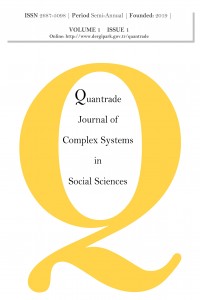Araştırma Makalesi
Yıl 2019,
Cilt: 1 Sayı: 1, 22 - 27, 11.12.2019
Öz
Behavioral finance
is a combination of economics and finance. Behavioral finance studies how
emotions and biases affect financial markets. The behavioral finance approach
includes the prospect theory and the efficient market hypothesis.
Prospect theory deals
with investors' attitudes towards stocks, while the effect of prices on
resources is examined in the efficient market hypothesis. Behavioral finance is interested in the
impact of factors such as overconfidence, mental accounting, and gambler's
fallacy among the factors affecting the investor's behaviors. This paper aims
to explain behavioral finance and the effect of behavioral finance on the
market value of a company.
Anahtar Kelimeler
Kaynakça
- Yörükoğlu Ali, Davranışsal Finans, Bankacılık ve Sigortacılık Enstitüsü, Yüksek Lisans Tezi, İstanbul 2007
- Gazel, Sümeyra ,(2014), Yatırım Psikolojisi, 5. Baskı, Ankara
- Günak, N.(2007), İleri Teknik Analiz Uygulamaları, İstanbul: Literatür Yayınevi
- Aslan, R., (2016), “Bireysel Yatırımcıları Finansal Yatırıma Yönlendiren Faktörlerin Davranışsal Finans Açısından Araştırılması: Şanlıurfa İline Bağlı Viranşehir İlçesi Örneği”, Yüksek Lisans Tezi, Çağ Üniversitesi, Sosyal Bilimler Enstitüsü.
- Şimşek, K. (2018), " Davranışsal Finans ve Yatırımcı İlişkileri", Yüksek Lisans Tezi, Galatarasay Üniversitesi, Sosyal Bilimler Enstitüsü.
- Tufan, E. (2003). Davranışsal Finans. Ankara: Orion Yayınevi.
- Kojabad, Arezou, Niki, (2012), “Menkul Kıymet Borsalarında Alınan Yatırımcı Kararlarına Davranışsal Finansın Etkileri: Tahran Menkul Kıymetler Borsası Örneği ve İMKB Karşılaştırması”, Yüksek Lisans Tezi, Ege Üniversitesi Sosyal Bilimler Enstitüsü, İzmir.
- Semra Öncü, Hüseyin Aktaş, Sibel Kargın, Rabia Aktaş, Nilgün Kayalı (2001) “Yatırımcıların Anormal Fiyat Değişimlerine Tepkisi”,s.5
- Barberris, Nicholas, Thaler, Richard (2002). A Survey of Behavioral Finance, NBER Working Paper Series 9222
- Bassidi, Hassan, lkabbouri, Mounime E (2013) The Contributions of Behavioral Finance To Explain The Value Relevance of Fundamental Value, International Review of Business Research Papers Vol. 9. No.1. January 2013 Issue. Pp. 52 –72
- Kaia Kask, (2003). "The Influence Of Investors’ Behaviour And Organisational Culture On Value İnvesting," University of Tartu - Faculty of Economics and Business Administration, in: Organisational Culture in Estonia: Manifestations and Consequences, volume 16, chapter 13, pages 237-255 Faculty of Economics and Business Administration, University of Tartu (Estonia)
- Hirshleifer, D. (2001). Investor psychology and asset pricing, Journal of Finance, No 56, pp. 1533-1598.
- Damodaran, A. (2003). Investment Philosophies: Successful Strategies and the Investors Who Made Them Work. John Wiley & Sons, 512 pp.
- Shleifer, A. (2000). Inefficient Market: An Introduction to Behavioral Finance. Oxford Univ. Press Inc., New York, 216 pp.
- Tversky, A., Kahneman, D. (1974). Judgement Under Uncertainty: Heuristics and Biases. Science, No 185, pp. 1124−31.
Yıl 2019,
Cilt: 1 Sayı: 1, 22 - 27, 11.12.2019
Öz
Kaynakça
- Yörükoğlu Ali, Davranışsal Finans, Bankacılık ve Sigortacılık Enstitüsü, Yüksek Lisans Tezi, İstanbul 2007
- Gazel, Sümeyra ,(2014), Yatırım Psikolojisi, 5. Baskı, Ankara
- Günak, N.(2007), İleri Teknik Analiz Uygulamaları, İstanbul: Literatür Yayınevi
- Aslan, R., (2016), “Bireysel Yatırımcıları Finansal Yatırıma Yönlendiren Faktörlerin Davranışsal Finans Açısından Araştırılması: Şanlıurfa İline Bağlı Viranşehir İlçesi Örneği”, Yüksek Lisans Tezi, Çağ Üniversitesi, Sosyal Bilimler Enstitüsü.
- Şimşek, K. (2018), " Davranışsal Finans ve Yatırımcı İlişkileri", Yüksek Lisans Tezi, Galatarasay Üniversitesi, Sosyal Bilimler Enstitüsü.
- Tufan, E. (2003). Davranışsal Finans. Ankara: Orion Yayınevi.
- Kojabad, Arezou, Niki, (2012), “Menkul Kıymet Borsalarında Alınan Yatırımcı Kararlarına Davranışsal Finansın Etkileri: Tahran Menkul Kıymetler Borsası Örneği ve İMKB Karşılaştırması”, Yüksek Lisans Tezi, Ege Üniversitesi Sosyal Bilimler Enstitüsü, İzmir.
- Semra Öncü, Hüseyin Aktaş, Sibel Kargın, Rabia Aktaş, Nilgün Kayalı (2001) “Yatırımcıların Anormal Fiyat Değişimlerine Tepkisi”,s.5
- Barberris, Nicholas, Thaler, Richard (2002). A Survey of Behavioral Finance, NBER Working Paper Series 9222
- Bassidi, Hassan, lkabbouri, Mounime E (2013) The Contributions of Behavioral Finance To Explain The Value Relevance of Fundamental Value, International Review of Business Research Papers Vol. 9. No.1. January 2013 Issue. Pp. 52 –72
- Kaia Kask, (2003). "The Influence Of Investors’ Behaviour And Organisational Culture On Value İnvesting," University of Tartu - Faculty of Economics and Business Administration, in: Organisational Culture in Estonia: Manifestations and Consequences, volume 16, chapter 13, pages 237-255 Faculty of Economics and Business Administration, University of Tartu (Estonia)
- Hirshleifer, D. (2001). Investor psychology and asset pricing, Journal of Finance, No 56, pp. 1533-1598.
- Damodaran, A. (2003). Investment Philosophies: Successful Strategies and the Investors Who Made Them Work. John Wiley & Sons, 512 pp.
- Shleifer, A. (2000). Inefficient Market: An Introduction to Behavioral Finance. Oxford Univ. Press Inc., New York, 216 pp.
- Tversky, A., Kahneman, D. (1974). Judgement Under Uncertainty: Heuristics and Biases. Science, No 185, pp. 1124−31.
Toplam 15 adet kaynakça vardır.
Ayrıntılar
| Birincil Dil | İngilizce |
|---|---|
| Bölüm | İnceleme Makalesi |
| Yazarlar | |
| Yayımlanma Tarihi | 11 Aralık 2019 |
| Kabul Tarihi | 11 Aralık 2019 |
| Yayımlandığı Sayı | Yıl 2019 Cilt: 1 Sayı: 1 |

